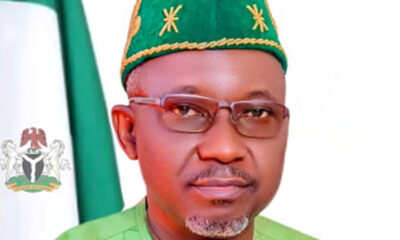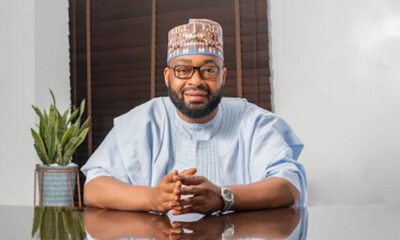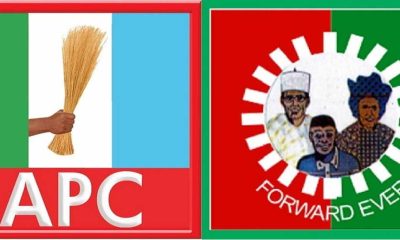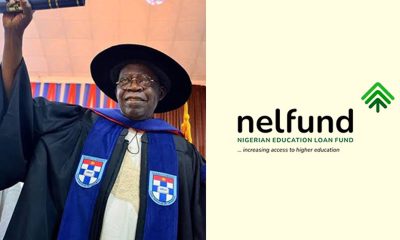News
Miners’ debt to banks rises 296% in Q3 2023 amidst states’ bans

Miners’ debt to banks rises 296% in Q3 2023 amidst states’ bans
The mining and quarrying sector witnessed a substantial influx of bank loans in the third quarter of 2023, with borrowing surging to approximately N12.76 billion, as detailed in the Central Bank of Nigeria’s (CBN) latest quarterly statistical bulletin.
This leap represents a staggering 296% increase from the N3.22 billion recorded in the preceding quarter, underscoring a robust appetite for capital despite broader economic challenges.
By the close of September 2023, the cumulative debt burden shouldered by firms within this sector had escalated by a notable 43% to N42.35 billion, up from N29.59 billion at the end of June 2023.
This financial trajectory is particularly noteworthy against the backdrop of regulatory headwinds, as some Nigerian states imposed bans on mining activities during the same period.
States’ Ban on Mining Activities
The landscape of Nigeria’s mining sector underwent significant regulatory shifts between June and September 2023, marked by a series of bans on mining activities across various states.
This period saw no fewer than five states—Taraba, Niger, Zamfara, Kebbi, and Enugu—impose restrictions, primarily targeting illegal mining operations, amid concerns over environmental degradation and insecurity.
READ ALSO:
- Police arrest 34 suspected kidnappers, rescued 22 victims in two weeks
- Guardiola lauds Manchester City’s ‘perfect’ 3-1 win at Copenhagen
- Police arrest ASP with ‘Indian hemp’ in Gombe
In June 2023, Taraba State Governor Agbu Kefas enacted Executive Order No. 3 to halt all mining activities effective June 23, 2023. By August, Niger State, under the directive of Governor Mohammed Umaru Bago, suspended all forms of mining. The following month, similar actions were taken in Zamfara, Kebbi, and Enugu, all aiming to address the resurgence of insecurity linked to mining activities.
These state-level interventions coincide with broader national security concerns. Previously, in 2022, the former Minister of Justice, Abubakar Malami, floated the idea of a nationwide mining ban as a strategy to undercut the financial pipelines fueling terrorist activities.
However, these measures have not been without controversy. The Miners Association of Nigeria (MAN) has criticised the state-imposed bans, arguing that such actions infringe on federal jurisdiction over mining and mineral resources.
The association’s grievances point to a contentious legal and regulatory landscape, which may further heighten the risk tendency of the mining sector.
The state bans, while aimed at curbing illegal mining and its associated security risks, also raise questions about the impact on legitimate enterprises and the broader economic implications for regions reliant on mining for revenue and employment.
The federal government, through Dele Alake, the Minister of Solid Minerals Development, clarified the legal landscape surrounding mining regulation, firmly stating that state governments lack the authority to regulate mining activities within their territories.
This declaration comes in the wake of a series of unilateral bans on mining activities by various state governments aimed at curtailing illegal mining operations and addressing associated security challenges. According to Alake, such state-level interventions are deemed illegal and contravene the provisions of the Nigerian constitution.
The minister emphasised the centralised nature of mining regulation, noting that any state interested in participating in mining activities must adhere to established legal processes, including applying for a licence through the appropriate federal channels.
READ ALSO:
- Alleged $6.23m fraud: Presidency asks Interpol to apprehend CBN staff, 2 others
- LASTMA arrests fake officer over N140,000 extortion
- Families scamper for safety as gas explosion razes 18 shops in Lagos
Also, Alake recently highlighted the strategic importance of solid minerals as a potential major revenue earner for the nation, urging sub-national governments to align with the federal government’s vision.
He advocated for states to position themselves as contributors to the national agenda by leveraging the mineral resources within their jurisdictions, albeit through legally mandated federal licencing and regulatory mechanisms.
More Insights
- The Solid Minerals Development Fund (SMDF), under the guidance of Executive Secretary and CEO Fatima Shinkafi, is placing a strategic emphasis on greenfield exploration, targeting the critical gap in data availability that hinders investment attraction in Nigeria’s mining sector.
- Shinkafi recently spoke about the inherent challenges of exploration, notably its cost-intensive and risky nature, which historically has deterred banks, known for their risk-averse lending practices, from financing ventures within the sector.
- Despite these challenges, a noticeable shift in the financial landscape is attributed to recent reforms spearheaded by the current Minister of Solid Minerals Development, Dele Alake.
- These reforms seem to have incrementally opened the doors to increased financing from the banking sector, signalling a departure from the traditional reluctance to engage with the mining industry due to its speculative nature.
- This shift is part of a broader strategy by the Federal Government, through initiatives like the SMDF, aimed at de-risking the mining sector to make it a more attractive investment proposition.
- Nigeria’s mining and quarrying sector is navigating a transformative era, buoyed by governmental efforts to mitigate risk and foster a conducive environment for investment.
- The concerted push to fill the data void through greenfield exploration is particularly significant, as it directly addresses one of the most substantial barriers to entry for potential investors.
- Moreover, the willingness of banks to reconsider their stance on lending to the sector reflects a broader re-evaluation of the mining industry’s potential as a viable and lucrative investment destination.
Miners’ debt to banks rises 296% in Q3 2023 amidst states’ bans
News
Just in: Factional Zamfara assembly leaders want governor to represent budget

Just in: Factional Zamfara assembly leaders want governor to represent budget
A factional House of Assembly has emerged in Zamfara state with members demanding the re-presentation of the 2025 Appropriation Bill by Governor Dauda Lawal.
The group, made up of nine lawmakers who were suspended in February 2024 over allegations of misconduct, conspiracy, and illegal sitting, convened in Gusau, the state capital, and declared the formation of a parallel legislative body.
At the session, the lawmakers elected Hon. Bashir Aliyu Gummi as Speaker of the factional assembly.
During the sitting, the faction addressed several issues, including the state’s deteriorating security situation, economic challenges, and the recent reports of mass sackings within the state civil service allegedly carried out by the Lawal administration.
READ ALSO:
- 2027: Atiku remains the best to face Tinubu, says Dele Momodu
- NLC to IMF: Your reforms inflict hunger, poverty on masses
- Nigerians deserve truth about electricity, not propaganda, labour slams power minister
The group further demanded that Governor Lawal re-present the 2025 budget, arguing that the process followed in its initial passage was flawed. The governor had originally submitted the N545 billion Appropriation Bill to the widely-known State House of Assembly led by Speaker Bilyaminu Ismail Moriki in December 2024. The bill was passed and signed into law that same month.
Present at Wednesday’s session were Hon. Aliyu Ango Kagara (Talata Mafara South), Ibrahim Tudu Tukur (Bakura), Nasiru Abdullahi Maru (Maru North), and Faruk Musa Dosara (Maradun 1). Others included Bashar Aliyu (Gummi 1), Bashir Abubakar Masama (Bukkuyum North), Amiru Ahmed (Tsafe West), Basiru Bello (Bungudu West), and Mukhtaru Nasiru (Kaura Namoda North).
Just in: Factional Zamfara assembly leaders want governor to represent budget
News
NLC to IMF: Your reforms inflict hunger, poverty on masses

NLC to IMF: Your reforms inflict hunger, poverty on masses
The Nigeria Labour Congress (NLC) has taken a swipe at the International Monetary Fund (IMF) over its policy proposals to Nigeria and other African nations on how to rejuvenate their ailing economies.
Indeed, the NLC pointedly told the IMF that its conditionalities for giving loans to Nigeria and others were inflict pains of hunger and poverty on the masses.
The NLC President, Joe Ajaero, stated this when he received the IMF team team comprising the its Resident Representative for Nigeria, Christian H. Ebeke, and, Axel Schimmelpfennig from Washington, DC.
The purpose of the visit, it was learnt, was to assess how Nigerian workers and the general populace are being affected by the current socioeconomic environment and the hardship resulting from government policies.
The IMF delegation, led by Schimmelpfennig also sought insights from the NLC regarding the state of the labour market in Nigeria. According to them, the information gathered would contribute to the IMF’s annual country report for Nigeria.
Sources at the meeting disclosed that the IMF team acknowledged that the Nigerian government has been grappling with fiscal challenges since assuming office.
They emphasized that the IMF’s recommendations are purely advisory and not mandatory, based on the prevailing realities in each country.
The delegation expressed concern that, often, governments do not follow the IMF’s recommendations to the letter, instead adapting them to align with political objectives. In effect, the IMF attempted to distance itself from the adverse consequences of some recent economic reforms in Nigeria.
READ ALSO:
- Nigerians deserve truth about electricity, not propaganda, labour slams power minister
- INEC may allow Nigerians without PVCs to vote in 2027
- Air Peace suspends flights over NIMET strike
Nevertheless, the IMF team requested continued engagement with the NLC going forward.
Ajaero made it clear that governance should prioritize citizens’ welfare over profit-making.
News
‘Enough is enough’, Tinubu directs security chiefs to stop violent attacks

‘Enough is enough’, Tinubu directs security chiefs to stop violent attacks
President Bola Tinubu has ordered security operatives to end forthwith the violent attacks in some parts of the country, especially in Plateau, Borno, and Benue states.
He gave the directive during a meeting with security chiefs at the State House on Wednesday.
The meeting was attended by Nuhu Ribadu, the national security adviser (NSA); Mohammed Mohammed, director-general of the National Intelligence Agency (NIA); Emmanuel Undianeye, chief of defence intelligence; Oluwatosin Ajayi, director-general (DG) of the Department of State Services (DSS); and Femi Gbajabiamila, chief of staff (CoS) to the President.
Speaking with journalists after the meeting, Ribadu said Tinubu declared that “enough is enough” on the resurgence of violence in some parts of the country.
The NSA said the president directed security chiefs to work with the political authorities in states and at the grassroots level to find a lasting solution to the insecurity.
He said the security chiefs had acted on Tinubu’s previous instructions by meeting with political leaders in the affected communities and states.
The NSA said the meeting offered the security chiefs the opportunity to fully brief the president about the current security situation of the country.
“This time, we were able to sit with him for hours and give a proper briefing. We also took new instructions from him,” he said.
“Insecurity is not only a government problem.
“It also involves the subnational units — the communities, local governments, and especially the governors. The president directed that we work more closely with them.
“Some of these problems are community-related. While not entirely so, that element plays a significant role.
“Mr. President is working hard to ensure that Nigeria enjoys peace and stability. We are not relenting. We will not stop until we get the results he demands.”
On the resurgence of violent attacks in Borno, Ribadu said the terrorists were planting explosives during the period of relative peace in the state.
“This enemy does not give up easily. When there’s peace for a long time, they try to shock the public with an isolated incident,” he said.
The NSA said the security situation in the country is not yet at 100 percent, while noting that there is “significant improvement”.
Since the beginning of the month, many have been killed in some communities in Plateau State.
Benue State has also recorded violent attacks as over 50 people were killed in Ukum and Logo LGAs on April 18.
-

 metro3 days ago
metro3 days agoRivers: Tinubu meets with Fubara, may lift his suspension
-

 metro2 days ago
metro2 days agoI’m not in supremacy battle with Ooni, says new Alaafin
-

 Entertainment1 day ago
Entertainment1 day agoP-Square: Jude Okoye freed after two months detention
-

 metro3 days ago
metro3 days agoBandits attack Kwara North, kill vigilante, six others
-

 Business2 days ago
Business2 days agoNigeria’s gas production increases by 15.6% to 227,931.65 mscf
-

 metro1 day ago
metro1 day agoNiger Gov Bago makes U-turn on dreadlocks ban after backlash
-

 News1 day ago
News1 day agoJust in: Factional Zamfara assembly leaders want governor to represent budget
-

 Politics1 day ago
Politics1 day agoLabour Party collapses into APC in Plateau











